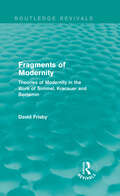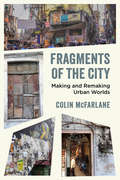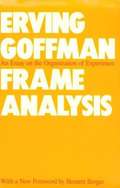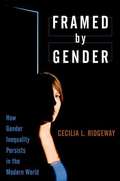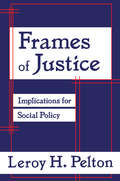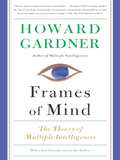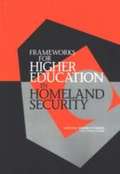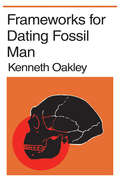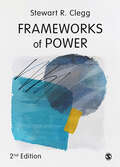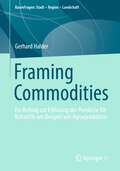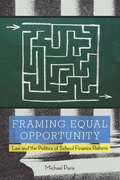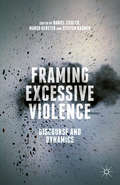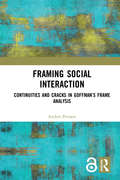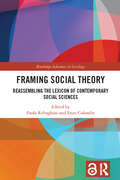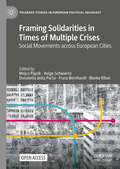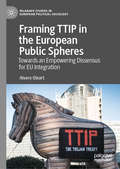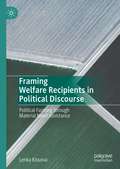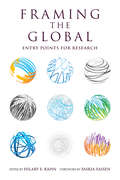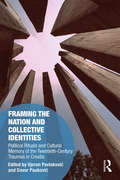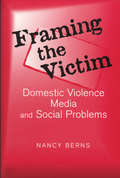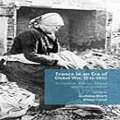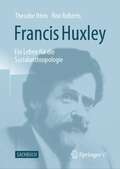- Table View
- List View
Fragments of Modernity: Theories of Modernity in the Work of Simmel, Kracauer and Benjamin (Routledge Revivals)
by David FrisbyFragments of Modernity, first published in 1985, provides a critical introduction to the work of three of the most original German thinkers of the early twentieth century. In their different ways, all three illuminated the experience of the modern urban life, whether in mid nineteenth-century Paris, Berlin at the turn of the twentieth century or later as the vanguard city of the Weimar Republic. They related the new modes of experiencing the world to the maturation of the money economy (Simmel), the process of rationalization of capital (Kracauer) and the fantasy world of commodity fetishism (Benjamin). In each case they focus on those fragments of social experience that could best capture the sense of modernity.
Fragments of the City: Making and Remaking Urban Worlds
by Colin McFarlaneCities are becoming increasingly fragmented materially, socially, and spatially. From broken toilets and everyday things, to art and forms of writing, fragments are signatures of urban worlds and provocations for change. In Fragments of the City, Colin McFarlane examines such fragments, what they are and how they come to matter in the experience, politics, and expression of cities. How does the city appear when we look at it through its fragments? For those living on the economic margins, the city is often experienced as a set of fragments. Much of what low-income residents deal with on a daily basis is fragments of stuff, made and remade with and through urban density, social infrastructure, and political practice. In this book, McFarlane explores infrastructure in Mumbai, Kampala, and Cape Town; artistic montages in Los Angeles and Dakar; refugee struggles in Berlin; and the repurposing of fragments in Hong Kong and New York. Fragments surface as material things, as forms of knowledge, as writing strategies. They are used in efforts to politicize the city and in urban writing to capture life and change in the world's major cities. Fragments of the City surveys the role of fragments in how urban worlds are understood, revealed, written, and changed.
Frame Analysis: An Essay on the Organization of Experience
by Erving GoffmanHe writes about the ways in which people determine their answers to the questions “What is going on here?” and “Under what circumstances do we think things are real?”
Framed by Gender: How Gender Inequality Persists in the Modern World
by Cecilia L. RidgewayIn an advanced society like the U.S., where an array of processes work against gender inequality, how does this inequality persist? Integrating research from sociology, social cognition and psychology, and organizational behavior, Framed by Gender identifies the general processes through which gender as a principle of inequality rewrites itself into new forms of social and economic organization. Cecilia Ridgeway argues that people confront uncertain circumstances with gender beliefs that are more traditional than those circumstances. They implicitly draw on the too-convenient cultural frame of gender to help organize new ways of doing things, thereby re-inscribing trailing gender stereotypes into the new activities, procedures, and forms of organization. This dynamic does not make equality unattainable, but suggests a constant struggle with uneven results. Demonstrating how personal interactions translate into larger structures of inequality, Framed by Gender is a powerful and original take on the troubling endurance of gender inequality.
Frames of Justice: Implications for Social Policy
by Leroy H. PeltonThis work is devoted to analyzing three major frames of justice--group justice, individual desert, and life affirmation--and their implications for social policy as well as their reflections in contemporary social policies. Pelton finds that all three frames of justice are reflected in the Bible and, later, the Koran. He contends that there is no evidence in the Bible of a genesis or development from one frame of justice to another. Rather, a sense of justice has existed in the human mind from time immemorial, with the three frames coexisting and manifesting themselves in both inter- and intra-group relations. The prominence of one frame over another at any particular point in history or in a particular geographical location is influenced by a variety of factors, though it is ultimately open to human choice.Pelton compares and contrasts the philosophies of nonviolence and liberalism in regard to the frames, and explores the relationships between principle, sentiment, reason, justice, and policy. He discusses social science's problematic relationship to justice in policymaking--for instance, how scholars have focused more on the effectiveness of policies, largely in terms of statistical outcomes reflecting aggregate data analyses, than on their justice. He goes on to explore in depth how frames of justice give direction to social policies, including those of genocide.Frames of Justice is an outstanding work that analyzes the question of justice and social policy, while simultaneously exploring the notion of desert in religion, philosophy, and legislation--especially within the context of the moral question of the relationship between means and ends--and contrasting it with the principle of life affirmation.
Frames of Mind: The Theory of Multiple Intelligences
by Howard GardnerFirst published in 1983 and now available with a new introduction by the author, Gardner's trailblazing book revolutionized the worlds of education and psychology by positing that rather than a single type of intelligence, we have several--most of which are neglected by standard testing and educational methods.
Frameworks For Higher Education In Homeland Security
by Committee on Educational Paradigms for Homeland SecurityThis report explores whether there are core pedagogical and skill-based homeland security program needs; examines current and proposed education programs focusing on various aspects of homeland security; comments on the possible parallels between homeland security, area studies, international relations, and science policy, as developed or emerging academic thrusts; and suggests potential curricula needs, particularly those that involve interdisciplinary aspects. The report concentrates almost exclusively on coursework-related offerings, primarily at the undergraduate and graduate levels.
Frameworks for Dating Fossil Man
by Kenneth P. OakleyThis is the first book to appear which correlates within a single volume the relevant data for both archeological and geological dating of human fossil remains. The author was trained both as a geologist and as a prehistorian, and has written this book first to meet the needs of archeologists wishing to learn the stratigraphical frameworks now applied to Quaternary deposits, and second to meet the needs of geologists requiring to know the terminology of Paleolithic and Mesolithic cultures.
Frameworks of Power
by Stewart R CleggFrameworks of Power is a coherent and comprehensive account of the different frameworks for understanding power that have been advanced by influential thinkers across the social sciences. A true classic in the field, the original edition proved hugely influential and a major point of reference for scholars at all levels concerned with power. Looking back to the classical literature on power, with special emphasis on Machiavelli and Hobbes, the book concentrates on the analysis of power - from both British and American social and political theorists, and from German Critical Theory and French theorists such as Foucault - and develops upon its theory and its application. The second edition includes a completely new chapter, A History of the Present, which offers a timely, engaging and provocative intervention by analysing three contemporary crises - the COVID-19 pandemic, Russia′s invasion of Ukraine and climate change - using the circuits of power framework that was the central concept of the original work. As well as being an essential textbook for all students in social science disciplines, this wide-ranging and innovative analysis will appeal to scholars in sociology, politics, organization studies and other disciplines.
Frameworks of Power
by Stewart R CleggFrameworks of Power is a coherent and comprehensive account of the different frameworks for understanding power that have been advanced by influential thinkers across the social sciences. A true classic in the field, the original edition proved hugely influential and a major point of reference for scholars at all levels concerned with power. Looking back to the classical literature on power, with special emphasis on Machiavelli and Hobbes, the book concentrates on the analysis of power - from both British and American social and political theorists, and from German Critical Theory and French theorists such as Foucault - and develops upon its theory and its application. The second edition includes a completely new chapter, A History of the Present, which offers a timely, engaging and provocative intervention by analysing three contemporary crises - the COVID-19 pandemic, Russia′s invasion of Ukraine and climate change - using the circuits of power framework that was the central concept of the original work. As well as being an essential textbook for all students in social science disciplines, this wide-ranging and innovative analysis will appeal to scholars in sociology, politics, organization studies and other disciplines.
Framing Commodities: Ein Beitrag zur Erklärung der Preiskrise für Rohstoffe am Beispiel von Agrarprodukten (RaumFragen: Stadt – Region – Landschaft)
by Gerhard HalderDie Jahre 2007/2008 brachten eine Preiskrise für Agrarprodukte und Nahrungsmittel, wie seit Jahrzehnten nicht mehr bekannt. Weltweit litten bis zu 115 Mio. Menschen zusätzlich Hunger. Unerhört war, dass die Krise im Vorfeld unerkannt blieb: Produktion und Verbrauch wurden wie in den Vorjahren angemessen prognostiziert, nicht aber die Preisspitzen und die Volatilität. Das Buch untersucht die Zusammenhänge, die zu dieser Preisekrise führten sowie auch die Gründe, warum deren Ursachen so lange unerkannt blieben.Während in der Wissenschaft, in der Politikberatung und in den Medien ganz überwiegend „realwirtschaftliche“ Faktoren von Störungen bei Angebot und Nachfrage (unzureichende Ernten in einzelnen Ländern, geringe Bevorratung, Biosprit-Boom, Nachfrageerhöhung v.a. in Asien) diskutiert wurden, lassen sich diese Argumente leicht dekonstruieren. Weder einzeln noch im Zusammenwirken können realwirtschaftliche Faktoren die Höhe und v.a. die Volatilität der Preise auch nur annähernd erklären.Dem gegenüber beklagen langjährige Akteure auf den Terminmärkten das zunehmende Auftreten neuer Akteure, die gewaltige Finanzvolumen einsetzen. Sie nutzen Terminbörsen für Rohstoffe – darunter Agrarrohstoffe – zur Absicherung ihrer Anlagen in anderen Märkten, da sich die Werte bei Rohstoffen angeblich gegenläufig zu anderen Anlageklassen bewegen. Zudem scheint es bei Terminkontrakten auf Rohstoffe eine Strategie zu geben, wie sich risikoarm verlässliche Renditen erzielen lassen.Eine unrühmliche Rolle kommt langjährig ausgewiesenen Vertretern der Wissenschaft zu: Sie legen theoretisch und empirisch dar, dass Spekulation auf den Terminmärkten ganz überwiegend keine signifikant (negative) Rolle bei den Preisentwicklungen zuzumessen ist. Diese Sichtweise setzt sich in den Internationalen Organisationen durch. Lediglich der Untersuchungsausschuss des US-Senats folgt den Einwänden der Praktiker, die auf folgende Sachverhalte verweisen: Die Wissenschaft nutzt eine völlig unangemessene Datenbasis, die nicht geeignet ist, übermäßige Spekulation aufzudecken. Sie setzt zur Analyse methodische Werkzeuge ein, die gerade bei hoher Volatilität der Preise unangemessen sind. Sie nutzten Theorien, die nur in idealen (theoretischen) Umgebungen Erklärungsgehalt bieten und in der Praxis keinerlei Relevanz besitzen.
Framing Equal Opportunity
by Michael ParisIn order to illuminate the crucial and often neglected role of legal translation in litigation-driven reform efforts, Paris (political science, City U. of New York-College of Staten Island) explores legal aspects--lawyers, rights claims, litigation, courts, and the like--in struggles to produce more egalitarian school finance and education policies. He focuses attention on would-be reformers and their mobilization of law and courts. Comparative case studies in New Jersey 1970-2009 and Kentucky 1983-2009 demonstrate details about the interplay between law and politics in litigation-based reform projects. Annotation ©2010 Book News, Inc. , Portland, OR (booknews. com)
Framing Excessive Violence: Discourse and Dynamics
by Daniel Ziegler Marco Gerster Steffen Kr�merThis book explores the dynamics of excessive violence, using a broad range of interdisciplinary case studies. It highlights that excessive violence depends on various contingencies and is not always the outcome of rational decision making. The contributors also analyse the discursive framing of acts of excessive violence.
Framing Sexual and Domestic Violence through Language
by Renate KleinWith examples from throughout Europe and the United States, the contributors to this volume explore how gender violence is framed through language and what this means for research and policy. Language shapes responses to abuse and approaches to perpetrators and interfaces with national debates about gender, violence, and social change.
Framing Social Interaction: Continuities and Cracks in Goffman’s Frame Analysis
by Anders PerssonThis book is about Erving Goffman’s frame analysis as it, on the one hand, was presented in his 1974 book Frame Analysis and, on the other, was actually conducted in a number of preceding substantial analyses of different aspects of social interaction such as face-work, impression management, fun in games, behavior in public places and stigmatization. There was, in other words, a frame analytic continuity in Goffman’s work. In an article published after his death in 1982, Goffman also maintained that he throughout his career had been studying the same object: the interaction order. In this book, the author states that Goffman also applied an overarching perspective on social interaction: the dynamic relation between ritualization, vulnerability and working consensus. However, there were also cracks in Goffman´s work and one is shown here with reference to the leading question in Frame Analysis – what is it that’s going on here? While framed on a "microsocial" level, that question ties in with "the interaction order" and frame analysis as a method. If, however, it is framed on a societal level, it mirrors metareflective and metasocial manifestations of changes and unrest in the interaction order that, in some ways, herald the emphasis on contingency, uncertainty and risk in later sociology. Through analyses of social media as a possible new interaction order – where frame disputes are frequent – and of interactional power, the applicability of Goffman’s frame analysis is illustrated. As such, this book will appeal to scholars and students of social theory, classical sociology and social interaction.
Framing Social Theory: Reassembling the Lexicon of Contemporary Social Sciences (Routledge Advances in Sociology)
by Enzo Colombo Paola RebughiniThis book proposes a reconstruction of contemporary social theory, focusing on thematic issues rather than on authors or schools of thought. In so doing, it endeavours to bridge epistemological approaches and locate critical claims shared by the main trajectories and notions of sociological theoretical debate. The book explores the current forms of social science theorization through the key themes of Agency, Anthropocene, Coloniality, Intersectionality, Othering, Singularization, Technoscience and Uncertainty. Focusing on these key themes, it highlights their usefulness for discussions of inequality, neoliberalism, eurocentrism, androcentrism or anthropocentrism – in order to examine these issues in a new light and look beyond the classic divides of social theory. Intended for an academic audience interested in social theory, scholars and post-graduate students in sociology, social sciences, anthropology, social geography, social psychology and globalization studies will find this book useful.
Framing Solidarities in Times of Multiple Crises: Social Movements across European Cities (Palgrave Studies in European Political Sociology)
by Donatella Della Porta Mojca Pajnik Helge Schwiertz Franz Bernhardt Marko RibaćThis open access book explores how polycrises not only generate new forms of inequality and social exclusion but also inspire new political activism, solidarity, and citizenship. It examines how social movement organizations frame their responses to exclusionary policies and regimes, and sheds light on their strategies for mobilization. By focusing on contemporary movements and their framing of social issues in times of crisis, the book offers valuable insights into social movement studies, urban studies, political communication, and frame analysis. It also engages with broader theoretical and public discussions on solidarity and citizenship. This book is ideal for scholars and students interested in social movements, political struggles, and fields such as migration, housing, and care.
Framing TTIP in the European Public Spheres: Towards an Empowering Dissensus for EU Integration (Palgrave Studies in European Political Sociology)
by Alvaro OleartThis book explores the debate and politicisation of the Transatlantic Trade and Investment Partnership (TTIP) negotiations in the Spanish, French and British public spheres. It addresses the questions of how and to what extent the national media discourses about TTIP were Europeanised, and how this type ofEuropeanisation contributes to the democratic legitimacy of the EU. The author argues that the politicisation of TTIP should be seen as a symptom of the ‘normal’ politics of a democratic polity, as it enlarges the political arena by embedding European issues into national political debates. Demands for ‘Another Europe is Possible’ empower rather than hinder the legitimacy of the EU.
Framing Welfare Recipients in Political Discourse: Political Farming through Material Need Assistance
by Lenka KissováThis book explores the shift towards individual responsibility that is increasingly evident in welfare systems across the world. The book will be of interest to students and scholars across sociology, social policy, and political science, with a particular focus on migration, minorities, political discourse, securitisation, social justice and human rights."This book offers a compelling read, analysing how workfare is legitimated in the Central European context, through the innovative metaphor of “political farming.” The analytical framework brings together several distinct streams of theorizing (critical discourse studies, critical security studies, governmentality, boundary-making, and the dynamics of ethnic relations) seamlessly and effectively. Through a very nuanced discursive analysis, Kissová shows how the poor, the offenders, and the “unadaptable” – categories policymakers use to talk about material need recipients – are linked pathologically with criminality, abuse of the system and other negative perceptions. This is a must-read text for anyone interested in how political actors justify questionable legislation that cements inequality in today’s neoliberal milieu.”— B. Nadya Jaworsky, Associate Professor, Sociology, Masaryk University, Czech Republic "Lenka Kissová’s book is clearly written and carefully researched. Her interdisciplinary insight and discursive analysis of parliamentary debates on Slovak “workfare” policies illustrates the deliberate, precise and politicized colocation of Roma marginalization and economic disadvantage, in a manner that starkly illustrates systemic racism dressed up as morally necessary regulatory reform. Moreover, her research has broader comparative and methodological relevance given how she layers in and utilizes governmentality, securitization and legitimation theory, unmasking how neoliberal economic assumptions and dog whistle politics, woven into the speech of politicians, works to demonize recipients as real or potential cheats and criminals, enact further social exclusion and heighten inequality and fear while not-so-subtly promoting existing prejudices. Her overarching metaphor—that of parliamentarians engaging in “political farming” where their ideas seed and take root in fertile soil of the national landscape resulting in regulatory “products”—effectively demonstrates how social reality generally and state regulation specifically can be constructed divorced from actual evidence, a process beyond her specific case and critically relevant to our times."— Barbara J. Falk, Professor, Department of Defence Studies, Canadian Forces College/Royal Military College of Canada, Fellow, Centre for European, Russian and Eurasian Studies, University of Toronto, Canada
Framing im Kontext von Straßenbenutzungsgebühren: Beeinflussung der Akzeptanz und der Nutzungsabsicht kostenpflichtiger Straßeninfrastruktur zugunsten einer nachhaltigen Mobilität (Verkehrspsychologie)
by Denise KaniokStraßenbenutzungsgebühren haben sich als technisch realisierbarer und effektiver Lösungsansatz für Verkehrsprobleme herausgestellt. Eine wichtige Voraussetzung für eine erfolgreiche Einführung dieser preispolitischen Maßnahme ist deren ausreichend hohe Akzeptanz. Denise Kaniok prüft mittels wissenschaftlicher Untersuchungen, inwieweit eine unterschiedliche Darstellungsweise von Straßenbenutzungsgebühren beeinflussende Wirkung auf die Bewertung und die Nutzungsabsicht kostenpflichtiger Straßeninfrastruktur hat. Denn bei der Betrachtung menschlicher Entscheidungsmuster wird deutlich, dass allein durch die unterschiedliche Formulierung eines Sachverhaltes, dem sogenannten Framing, divergierende Entscheidungen hervorgerufen werden können. Die Ergebnisse deuten auf einen Einfluss der Informationsdarstellung auf menschliche Entscheidungen hin. Insbesondere bezüglich der Faktoren Zeit und Kosten zeigt sich eine hohe Sensitivität. Drohende Zeitverluste führen zu stärkeren Verhaltenseffekten als in Aussicht gestellte identische Zeitgewinne. Es wird eine stärkere Fokussierung auf den Deutungsrahmen empfohlen, sodass mittels gezielt eingesetzter Informationsdarstellung Verhaltens- und Einstellungsmuster im Sinne von nachhaltiger Mobilität hervorgerufen werden.
Framing the Global: Entry Points for Research (Framing the Global)
by Saskia Sassen Hilary E. KahnFraming the Global explores new and interdisciplinary approaches to the study of global issues. Essays are framed around the entry points or key concepts that have emerged in each contributor's engagement with global studies in the course of empirical research, offering a conceptual toolkit for global research in the 21st century.
Framing the Nation and Collective Identities: Political Rituals and Cultural Memory of the Twentieth-Century Traumas in Croatia (Memory Studies: Global Constellations)
by Vjeran Pavlaković Davor PaukovićThis book analyzes top-down and bottom-up strategies of framing the nation and collective identities through commemorative practices relating to events from the Second World War and the 1990s "Homeland War" in Croatia. With attention to media representations of commemorative events and opinion poll data, it draws on interviews and participant observation at commemorative events to focus on the speeches of political elites, together with the speeches of opposition politicians and other social actors (such as the Catholic Church, anti-fascist organizations and war veterans’ and victims’ organizations) who challenge official narratives. Offering innovative approaches to researching and analyzing commemorative practices in post-conflict societies, this examination of a nation’s transition from a Yugoslav republic to an independent state – and now the newest member of the European Union – constitutes a unique case study for scholars of cultural memory and identity politics interested in the production and representation of national identities in official narratives.
Framing the Victim: Domestic Violence, Media, and Social Problems (Social Problems & Social Issues)
by Nancy S. Berns"Whether you are drawn to this book because of an interest in media, social problems, or domestic violence, reading it will help you better understand the impact media stories have on our perceptions of social problems." That is how Nancy Berns introduces her book. It is a work that unabashedly examines not only domestic violence, but also the larger picture of how politics and processes shape our responses to social problems. Framing the Victim also distinguishes serious research from media, which promote entertainment, empowerment, and drama.
France in an Era of Global War, 1914–1945
by Ludivine BrochIn France in an Era of Global War, scholars re-examine experiences of French politics, occupation, empire and entanglements with the Anglophone world between 1914 and 1945. In doing so, they question the long-standing myths and assumptions which continue to surround this period, and offer new avenues of enquiry.
Francis Huxley: Ein Leben für die Sozialanthropologie
by Ron Roberts Theodor IttenDieses Buch über das Leben und Werk von Francis Huxley (1923–2016) zeichnet zugleich die Suche nach dem Verständnis der Conditio humana nach und nimmt seine Leserinnen und Leser mit auf eine biografische, philosophische, kulturelle, historische, politische und epistemologische Erkundungsreise.Als Mitglied der berühmten Huxley-Dynastie leistete Francis Huxley wichtige und innovative Beiträge zur Sozialanthropologie, zur Pflege der psychischen Gesundheit und zum Schutz indigener Völker. Seine ungewöhnliche Laufbahn und Lebensgeschichte zeigen, wie die Produktion und Verbreitung von Ideen in einem intergenerationellen und soziologischen Kontext verstanden werden kann. Das Buch reflektiert die zeitgenössische Relevanz von Huxleys Werk und stellt Verbindungen her zwischen den zentralen philosophischen, kulturellen, wissenschaftlichen und politischen Themen des turbulenten frühen 21. Jahrhunderts und den überdauernden Fragen, die die Menschen auf der Suche nach dem Verständnis ihrer selbst und ihres Platzes in der Welt antreiben. Dieses Buch ist für alle Studierenden, Forschenden und Lehrenden der Sozial- und Geisteswissenschaften von Interesse.Dieses Buch ist eine gründliche und faszinierende Darstellung des Lebens meines Onkels Francis, mit all seinen Schatten und Sonnenseiten. Die Autoren beschreiben seinen sprunghaften Charakter gut. Sie geben eine genaue Einschätzung seines Lebenswerkes und seiner Schriften Victoria Huxley, Nichte. Diese Studie über Francis Huxley ist willkommen und überfällig, denn er war einer der größten Sozialanthropologen der indigenen Völker Amazoniens. Seine Beobachtungen waren gründlich, wissenschaftlich korrekt und entsprachen den höchsten Standards seiner Disziplin. Huxley war in zweierlei Hinsicht außergewöhnlich. Sein reizvoller Schreibstil vermittelte seine Leidenschaft sowohl den allgemeinen LeserInnen als auch den WissenschaftlerInnen. Er war mir ein herzlicher Freund, den Menschen der indigenen Völker, die er studierte, wie ein dazugehöriger. Francis war fasziniert von deren Mythologien und ihren geistigen sowie spirituellen Welten. Er konnte sich gut in sie einfühlen und dachte fast wie einer von ihnen. John Hemming, Autor von Menschen des Regenwaldes Dies ist ein ungemein fesselndes und packendes Buch. Nachdenklich und gut geschrieben, vermittelt es gekonnt und mit großem Einfühlungsvermögen die vielen faszinierenden Schichten von Francis Huxley, sein reiches und vielfältiges Leben, sowie seine Vorlieben und seine Philosophie. Fiona Watson, Survival International
